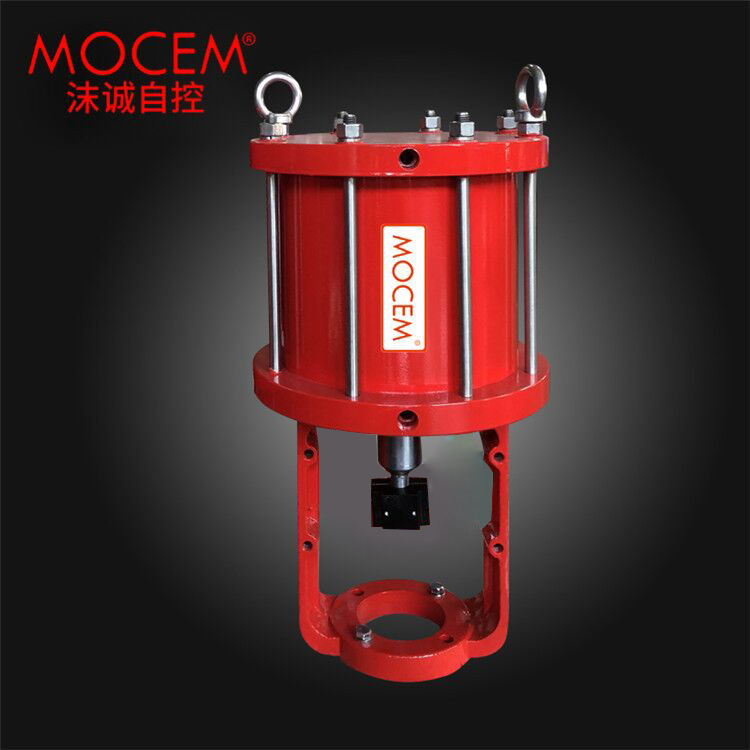Working principle of pneumatic actuator
1. Working principle diagram of double acting pneumatic actuator
When the air source pressure enters the middle chamber between the two pistons of the cylinder from the air port (2), the two pistons are separated to both ends of the cylinder, the air in the air chambers at both ends is discharged through the air port (4), and the two piston teeth drive the output shaft (gear) to rotate counterclockwise. On the contrary, when the air supply pressure enters the air chambers at both ends of the cylinder from the air port (4), the two pistons move towards the middle of the cylinder, the air in the middle air chamber is discharged through the air port (2), and the two piston racks synchronously drive the output shaft (gear) to rotate clockwise. (If the piston is installed in the opposite direction, the output shaft will rotate in the opposite direction)
2. Working principle diagram of single acting pneumatic actuator
When the air source pressure enters the middle chamber between the two pistons of the cylinder from the air port (2), the two pistons are separated to both ends of the cylinder, forcing the springs at both ends to compress, the air in the air chambers at both ends is discharged through the air port (4), and the two piston teeth drive the output shaft (gear) to rotate counterclockwise. After the air source pressure is changed through the solenoid valve, the two pistons of the cylinder move towards the middle under the elasticity of the spring, and the air in the middle air chamber is discharged from the air port (2), so that the two piston frames synchronously drive the output shaft (gear) to rotate clockwise. (If the piston is installed in the opposite direction, the output shaft will rotate in the opposite direction when the spring returns.).
III. Classification of pneumatic actuators
1. Membrane actuator
Membrane actuators are commonly used, and can be used as the general control valve pushing device of pneumatic membrane actuators. The signal pressure p of the pneumatic diaphragm actuator acts on the diaphragm, causing it to deform, driving the push rod on the diaphragm to move, causing displacement of the valve core, thus changing the opening of the valve. The utility model has the advantages of simple structure, low price, convenient maintenance and wide application.
Pneumatic membrane actuator has two forms: positive action and reaction.
When the signal pressure of the controller or valve positioner increases, the valve stem moves downward, which is called positive actuator; When the signal pressure increases, the valve rod moves upward, which is called the reverse actuator. The signal pressure of the positive acting actuator passes through the membrane air chamber above the corrugated membrane; The signal pressure of reaction actuator passes through the membrane air chamber below the corrugated membrane. Both can be modified by replacing individual parts.
2. Piston actuator
The pneumatic piston actuator moves the piston in the cylinder to generate thrust. Obviously, the output strength of the piston is far greater than that of the membrane type. Therefore, the film type is suitable for small output and high precision occasions; The piston type is suitable for large output occasions, such as large diameter, high pressure drop control or butterfly valve drive device. In addition to membrane type and piston type, there is also a long stroke actuator with long stroke and large torque, which is suitable for the occasion of output angular displacement and large torque.
The signal standard received by the pneumatic actuator is 0.02 to 0.1MPa.
The main components of pneumatic piston actuator are cylinder, piston and push rod. The piston in the cylinder moves with the change of the pressure difference between the two sides of the cylinder. It can be divided into proportional type and two digit type according to characteristics. According to the operating pressure on both sides of the input piston, the piston is pushed from the high-pressure side to the low-pressure side. Proportional type is a valve positioner based on two position type to make the displacement of push rod proportional to the signal pressure.
3. Rack and pinion actuator
Gear rack (double piston rack) pneumatic actuator is compact in structure, beautiful in appearance, fast in response, stable in operation and long in service life. All accessories adopt anti-corrosion treatment technology, which can adapt to various harsh conditions. High and low temperature actuators and actuators with various special strokes perform well in various application fields.







